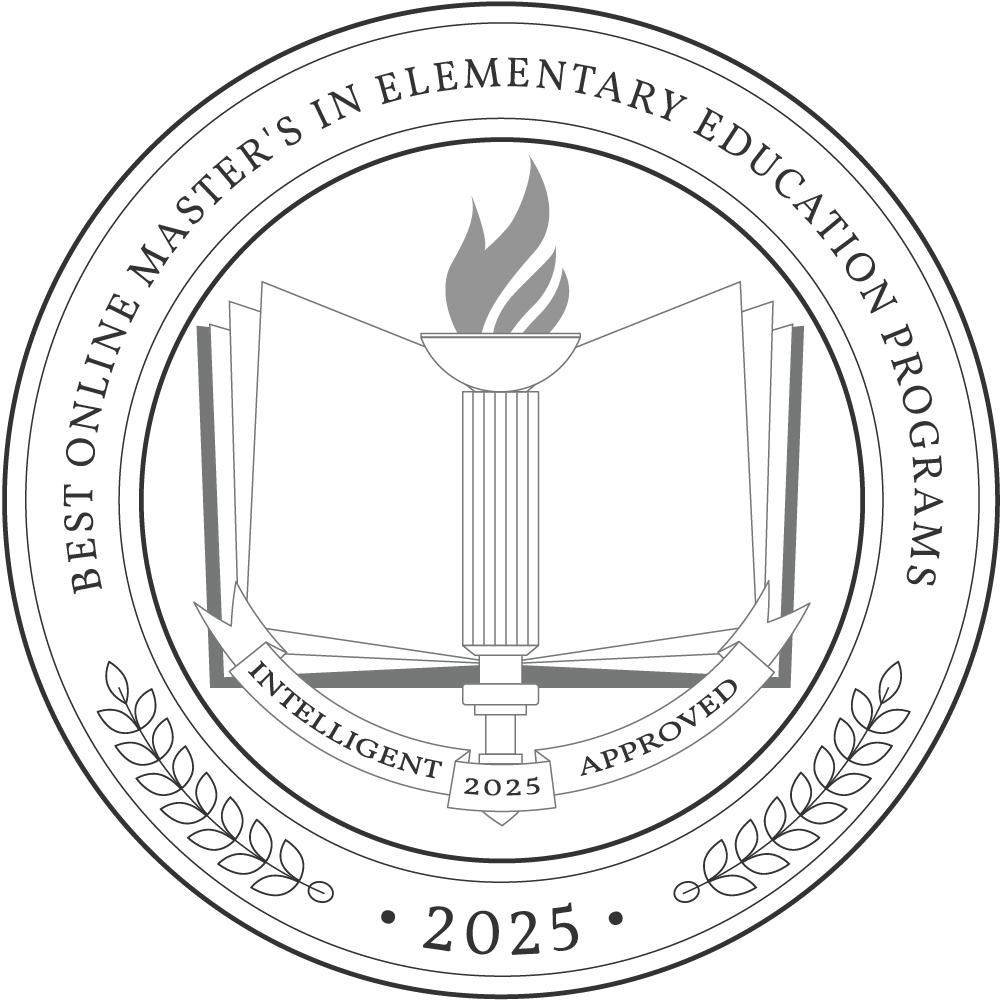An online master’s in elementary education introduces students to new teaching and management techniques to implement in the classroom. In most districts, a master’s degree can boost income for kindergarten and elementary school teachers, who earn a median annual salary of $63,670. Teachers will also have the option to move into roles outside the classroom, such as instructional coordinator — this occupation has a median annual salary of $74,620.
Tuition costs for an online master’s in elementary education will vary by institution. On average, graduate school tuition is $12,596 at public institutions and $28,017 at private universities, according to the National Center for Education Statistics.
Why Trust Us
The Intelligent.com Higher Education Team is dedicated to providing students with independent, equitable school and program rankings and well-researched resources. Our expert-driven articles cover topics related to online colleges and programs, paying for school, and career outlooks. We use data from the U.S. Department of Education’s College Scorecard, the National Center for Education Statistics, and other reputable educational and professional organizations. Our academic advisory team reviews content and verifies accuracy throughout the year for the most current information. Partnerships do not influence rankings or editorial decisions.
- Analyzed over 2,000 national, accredited, and nonprofit colleges and universities
- 800+ rankings pages are reviewed and updated yearly
- Content is informed by reputable sources, surveys, and interviews with academic advisors and other experts
- Over 100 data points are reviewed for accuracy and quality throughout the year, including sources
How we rank schools
Our list features the best online Elementary Education degree programs at top colleges nationwide. Each school featured is a nonprofit, accredited institution — either public or private — with a high standard of academic quality for post-secondary institutions.
We evaluated each school’s program on tuition costs, admission, retention and graduation rates, faculty, reputation, and the student resources provided for online students. We collected data from trusted sources like the National Center for Education Statistics, individual school and program websites, school admissions counselors, and other data sources. Then, we calculated the Intelligent Score on a scale of 0 to 100 based on the following criterion:
Academic Quality:
- Admission rate versus enrollment rate
- Retention rate of students who return after year one
- Accreditation status (regional and programmatic)
- Nonprofit status, both private and public institutions
Graduation Rate
- Overall graduation rate
- Total number of currently enrolled students, including diversity metrics
- Student-to-faculty ratio
Cost and ROI
- In-state and out-of-state per-credit tuition rates and fees
- Required credits to graduate
- Earning potential after graduation
- Availability of federal student loans, scholarships, and other financial aid options
Student Resources
- Available student services for online-only and hybrid programs
- On-campus amenities like tutoring centers and the number of libraries
Read more about our ranking methodology.
Best 50 Accredited Online Master’s in Elementary Education Programs
FiltersInstitution Type
Status
- Intelligent Score
- Alphabetically By University Name
- Acceptance Rate
- Enrollment
- In-state Graduate Tuition
- Out-of-state Graduate Tuition
- In-state Undergraduate Tuition
- Out-of-state Undergraduate Tuition

University of Alabama
Intelligent Score: 99.63In-state: $10,780
Out-of-state: $30,250
In-state: $10,780
Out-of-state: $10,780
SAT: 1070-1330
ACT: 23-31
$440
Online
Council for the Accreditation of Educator Preparation
30-36

University of North Carolina at Charlotte
Intelligent Score: 98.08In-state: $7,019
Out-of-state: $34,198
In-state: $10,552
Out-of-state: $10,552
SAT: 1280-1490
ACT: 28-33
Resident: $289
Non-Resident: $537 - $1,098
Online
Council for the Accreditation of Educator Preparation
30

Ball State University
Intelligent Score: 97.58In-state: $9,482
Out-of-state: $26,470
In-state: $9,328
Out-of-state: $9,328
SAT: N/A
ACT: N/A
Resident: $464
Non-Resident: $696
Online
Council for the Accreditation of Educator Preparation
30

Mississippi College
Intelligent Score: 97.46In-state: $18,200
Out-of-state: $18,200
In-state: $11,610
Out-of-state: $11,610
SAT: 1140-1260
ACT: 21-29
$399
Online
Council for the Accreditation of Educator Preparation
30

East Carolina University
Intelligent Score: 96.18In-state: $4,452
Out-of-state: $20,729
In-state: $4,749
Out-of-state: $4,749
SAT: 1020-1170
ACT: 19-24
Resident: $283
Non-Resident: $1,013
Online
Council for the Accreditation of Educator Preparation
33

Western Governors University
Intelligent Score: 95.59In-state: $6,380
Out-of-state: $6,380
In-state: $7,500
Out-of-state: $7,500
SAT: N/A
ACT: N/A
$487
Online
Council for the Accreditation of Educator Preparation
49

Southeast Missouri State University
Intelligent Score: 95.58In-state: $6,779
Out-of-state: $12,951
In-state: $5,373
Out-of-state: $5,373
SAT: N/A
ACT: N/A
$383
Online
Council for the Accreditation of Educator Preparation
30

University of Alaska Southeast
Intelligent Score: 94.85In-state: $32,089
Out-of-state: $46,968
In-state: $32,437
Out-of-state: $32,437
SAT: NA
ACT: NA
Resident: $513
Non-Resident: $1,079
Online
Northwest Commission on Colleges and Universities
36-39

University of Louisiana Monroe
Intelligent Score: 94.05In-state: $5,407
Out-of-state: $19,135
In-state: $5,511
Out-of-state: $5,511
SAT: 1000-1210
ACT: 20-26
$500
Online
National Council for Accreditation of Teacher Education
45

University of West Georgia
Intelligent Score: 92.23In-state: $4,371
Out-of-state: $15,426
In-state: $4,338
Out-of-state: $4,338
SAT: 900-1090
ACT: 17-22
$241
Online
Southern Association of Colleges and Schools Commission on Colleges
36

Kansas State University
Intelligent Score: 91.49In-state: $9,375
Out-of-state: $25,251
In-state: $10,212
Out-of-state: $10,212
SAT: N/A
ACT: N/A
$536
Online
Council for the Accreditation of Educator Preparation
31

University of West Alabama
Intelligent Score: 90.76In-state: $9,100
Out-of-state: $18,200
In-state: $6,678
Out-of-state: $6,678
SAT: N/A
ACT: 17-22
$429
Online
Council for the Accreditation of Educator Preparation
33

Kennesaw State University
Intelligent Score: 90.46In-state: $4,450
Out-of-state: $15,704
In-state: $5,328
Out-of-state: $5,328
SAT: 1030-1200
ACT: 19-25
$383
Online
Southern Association of Colleges and Schools Commission on Colleges
36

Liberty University
Intelligent Score: 90.41In-state: $14,791
Out-of-state: $14,791
In-state: $7,935
Out-of-state: $7,935
SAT: 1040-1250
ACT: 21-29
$415 - $615
Online
Council for the Accreditation of Educator Preparation
45

Delta State University
Intelligent Score: 89.53In-state: $7,951
Out-of-state: $7,951
In-state: $7,951
Out-of-state: $7,951
SAT: 885-1125
ACT: 18-23
$469
Online
Council for the Accreditation of Educator Preparation
30

Auburn University at Montgomery
Intelligent Score: 87.6In-state: $10,080
Out-of-state: $30,240
In-state: $10,080
Out-of-state: $10,080
SAT: 1160-1320
ACT: 25-31
Resident: $469
Non-Resident: $516
Online, On-Campus
Council for the Accreditation of Educator Preparation
30

University of North Alabama
Intelligent Score: 87.42In-state: $9,600
Out-of-state: $19,200
In-state: $6,660
Out-of-state: $6,660
SAT: N/A
ACT: N/A
$495
Online
Council for the Accreditation of Educator Preparation
33

Concordia University Chicago
Intelligent Score: 87.41In-state: $32,660
Out-of-state: $32,660
In-state: $9,090
Out-of-state: $9,090
SAT: 990-1180
ACT: 19-25
$510
Online
Higher Learning Commission
42
How to Choose an Online Master’s in Elementary Education Program
Choose your area of study
Depending on the program, this degree may be available as a Master of Education (MEd), Master of Science (MS), or Master of Arts (MA). Most programs also allow you to select a concentration and focus your studies on a particular niche in this field, such as curriculum development, educational technology, English as a second language, or science, technology, engineering, and math (STEM) education. Carefully consider what you would like to do after you graduate, then look for programs that closely match these career goals.
Research schools and programs
You should only apply to institutions that have been approved by a DOE-recognized regional accrediting organization, such as the New England Commission of Higher Education or Northwest Commission on Colleges and Universities. These organizations evaluate schools to ensure they provide students with a high-quality education. Those who attend a school that isn’t regionally accredited may be unable to access financial aid or transfer credits to another institution if needed.
Ideally, your master’s in elementary education program will also be accredited by a respected industry group like the Council for the Accreditation of Educator Preparation (CAEP). This accrediting organization has particularly high standards for education-related programs.
You should also look for answers to the following questions:
- What are the credentials of the faculty members?
- What are the in-person requirements of the program?
- What support services are available for online students?
To learn more about any schools that you’re interested in, you can visit the school’s website, contact an admissions counselor, follow the school on social media, or attend an in-person or virtual open house.
Prepare for tests and applications
Application requirements vary by school and program, so it’s always wise to confirm with the school’s admissions office what they need for a complete application. A standard application packet for a master’s program includes:
- Application
- Official undergraduate transcripts showing degree completion and final GPA
- Resume
- Personal statement or essay
- Letters of recommendation
Schools may also request GRE scores, although an increasing number of schools are waiving this requirement.
Select your program
When selecting the best online master’s in elementary education program, you should find one that meets your personal, professional, academic, and social needs. Create a list with one column for things a program must have, then a column for what you hope they have but can do without. The ones that match should be at the top of the application list.
Because sending multiple applications simultaneously can be costly, students may want to pick two to three top choices to begin the process. They can apply to others later, if necessary.
Before making your final decision, review your needs and goals again. Do you plan to attend school full-time or part-time? Do you want your program to be as online as possible, or are you fine with a hybrid program that has a fair amount of in-person requirements? Some programs offer asynchronous courses, which can be completed at your own pace, while others only offer synchronous courses, which involve remotely attending lectures and completing assignments at the same time as other students — which of these two online learning formats do you prefer? Your school should accommodate your scheduling needs and learning preferences.
Determine how you will pay for your degree
The first step in seeking financial assistance is completing the Free Application for Federal Student Aid (FAFSA). Billions of dollars in scholarships and grants are left on the table each year. By completing the FAFSA, students can take advantage of this opportunity. Students may qualify for local, state, or federal scholarships and grants.
Students working full-time jobs while attending an online master’s in elementary education program can check with their employer about tuition assistance or reimbursement options. Additionally, students should apply for fellowships, assistantships, and work-study programs to reduce the cost of their master’s program.
Be sure to speak to financial aid counselors at the schools you’re interested in for the most accurate and specific information about program cost.
What Can You Expect from an Online Master’s in Elementary Education Program?
Prospective students in an online master’s in elementary education program can expect to spend at least two years (between 30 and 40 credit hours) completing core curriculum and electives. Students will study topics relevant to education, such as teaching students with different competency levels, from special education to gifted. Concentration areas include curriculum development, leadership, new technologies, classroom management, and teaching techniques.
Practicums are required to help students gain real-world experience in an education setting, supervised by a licensed educator. For example, a student in an elementary education program who plans to teach will work alongside a teacher at an approved school.
Potential courses you’ll take in an online master’s in elementary education degree program
- Educational Research and Assessment. Students learn to research current classroom and school topics and apply the findings. They gain skills in data collection, assessment, evaluation, and implementation.
- Laws and Ethics in Education. This course prepares students to better understand the code of ethics set forth by the National Education Association. Students will also examine case studies and collaborate on solutions for various unethical scenarios. Legal aspects in education focus on the laws teachers and administrators must abide by while employed.
- Leadership Styles in Education. Students will learn their leadership style and how to use it to promote learning. Various leadership styles are discussed, including democratic, constructivist, transformational, and instructional.
- Childhood Development. Students learn the various developmental stages in elementary-aged children and how they learn at each stage. Topics may include the brain, language, and literacy as well as psychological, physical, and social development. Students also learn how to foster growth and development in the classroom.
- Observation and Assessment. Students learn to observe children in different educational environments and use their observations to make positive changes in and out of the classroom. They learn to use findings to improve safety in the school and promote learning individually and as a group. Students may be required to conduct observations for graded projects.
What Can You Do With an Online Master’s in Elementary Education?
Career outlook
A master’s in elementary education certainly prepares students for careers in direct classroom education, but it also provides the background for supervisory and management positions.
Graduates may also apply their training and experience to careers that don’t involve teaching, such as curriculum development and consulting. Those with this degree may also oversee nonschool-related programs intended for elementary-age children. Below are some more details on common career paths for this degree and what they entail:
- Kindergarten or elementary school teacher — Teach basic subjects, such as reading and the fundamental concepts of mathematics, to young children in order to prepare them for further education.
- Median annual salary: $63,670
- Projected employment growth (through 2032): 1%
- New job openings projected: 109,000 annually
- Elementary, middle, or high school principal — Oversee school staff and operations at the K-12 level.
- Median annual salary: $103,460
- Projected employment growth (through 2032): 1%
- New job openings projected: 20,200 annually
- Instructional coordinator — Develop, implement, and assess the effectiveness of educational materials.
- Median annual salary: $74,620
- Projected employment growth (through 2032): 2%
- New job openings projected: 19,200 annually
Online Master’s in Elementary Education Degree Program Frequently Asked Questions
How do I apply to an online master’s in elementary education degree program?
Before submitting any documents, it is crucial to contact an admissions counselor. They can answer any questions about the application process, including whether application waivers exist and which scholarships are available.
Preparation of application materials should begin months before the application deadline. Request transcripts and test scores, write a personal statement on why you are getting a master’s in elementary education, and ask reputable teachers and leaders to write a recommendation.
Create your resume and include clubs, awards, achievements, and extracurricular activities.
How much does an online master’s in elementary education degree program cost?
The cost of an online master’s in the elementary education program depends on many factors. Each university charges a base tuition fee, although they may also add extra fees for technology, library resources, student activities, learning support services, etc. In general, private schools are more expensive than public schools, and public schools usually charge out-of-state students a higher tuition rate than in-state students.
How long does it take to earn an online master’s in elementary education degree?
Most online master’s in elementary education programs require between 30 and 40 credit hours to complete. Taking online courses may allow flexibility in starting and finishing a course. You can shorten your program completion time if you do not have to wait until a semester begins to start a class.
Another determinant is whether you attend part-time or full-time. Full-time students typically finish in two years, while part-time students need three years or more. Occasionally, a school will offer an accelerated program, allowing you to complete the program in less than 18 months.
Is an online master's in elementary education worth it?
If you want to get out of classroom teaching into a management-level position, a master’s degree will likely be required. These supervisory positions also tend to come with a significant pay bump.
Pursuing an online master’s in elementary education can help you further hone your teaching skills and understand how students learn and retain information. Some people choose to focus on a specific subject, mode of learning, or student population, such as special education.
An online degree program is an excellent option for those who need to earn a master’s degree for their licensing requirements. Remote learning includes all of the benefits of faculty and student interaction and networking while letting you work from the convenience of your home — or around a current teaching schedule.
Read More about Online Master’s in Elementary Education Degrees
Compare School Options
Related Degrees
- Assessment and Measurement
- Science Education
- Educational Leadership
- Early Childhood Education
- Reading and Literacy
- Special Education
- Educational Administration
- Elementary Education
- Child Development
- Math Education
